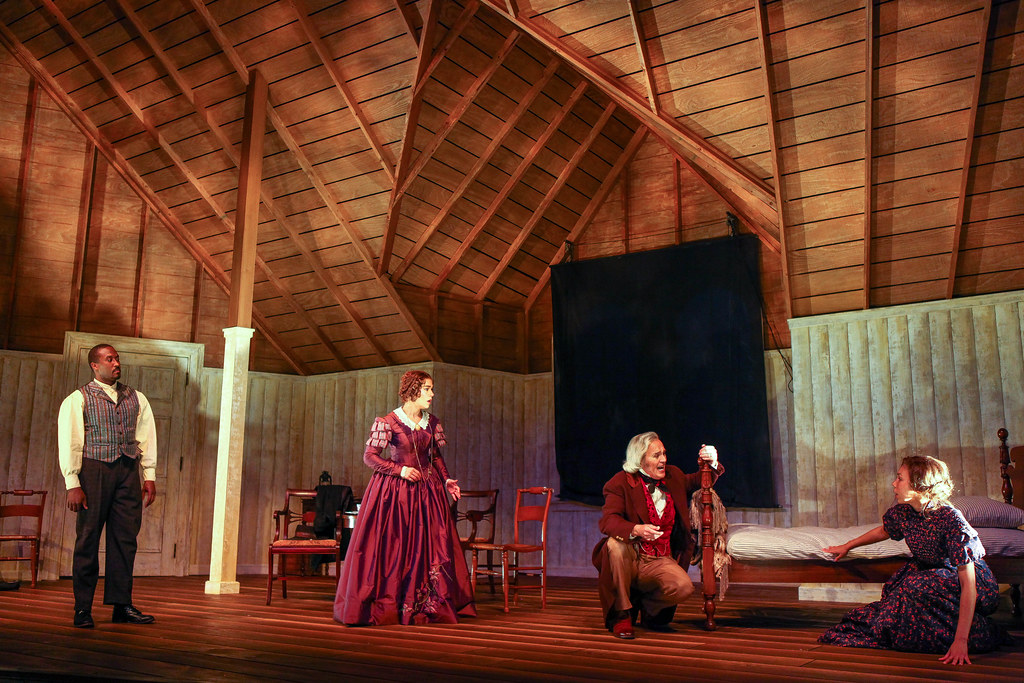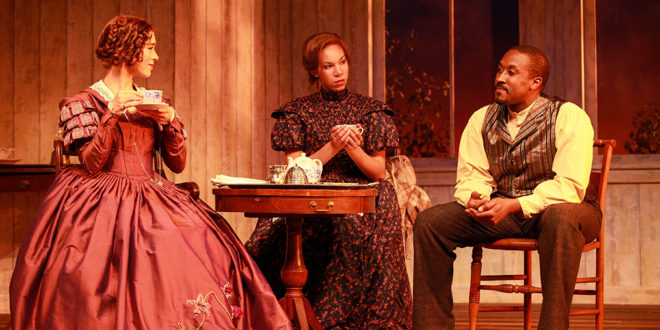Review of historic play’s world premiere
Syracuse has been gripped by a telling tale of the “fair lady fugitive” in this world premiere of “Possessing Harriet,” that runs through Nov. 4 at Syracuse Stage.

Playwright Kyle Bass, associate artistic director of Syracuse Stage, sets the stage for this enigmatic portrayal of slavery and the notion of freedom in Central New York in the early 19th century. Along with the theater company’s former artistic director Tazewell Thompson as director, “Possessing Harriet” is nothing short of a powerfully fragile delivery which brings this slice of forgotten Syracuse history to the fore.
A beautiful Autumn light streams through the windows of the wooden set – characteristically executed by Donald Eastman – depicting the third-floor room of the mansion of known abolitionist Gerrit Smith. This room in the New York hamlet of Peterboro, about 25 miles southeast of Syracuse, serves as the one constant location for the true story executed in real time, with four characters, no costume changes and a narrative that leaves the audience craving more than 90 minutes.
Set in 1839, “Possessing Harriet” brings forth the plight of Harriet Powell, a quadroon (one quarter black) typically associated with “N’Orleans,” carrying a legacy of enviable beauty with her. Nicole King characterizes the light-complexioned, brown-haired, tall and slender 24-year-old Powell in the most demure and effectual manner. She arrived in Syracuse with her masters, the Davenport family, residing at Syracuse House hotel.
Powell successfully escapes the family’s clutches with the help of fellow black freedom seekers and abolitionists such as Smith and makes her final journey to freedom through the Underground Railroad in Canada. The play takes place during this interim, from dawn to dusk, at Smith’s home.
It’s a short span packed with intense deliveries by the four characters, most profoundly witnessed between Smith — carried ably by Wynn Harmon – and his niece, firebrand Elizabeth Cady (later Stanton). The 24-year-old forward thinking woman, who went on to be a torchbearer of women’s rights and the abolition of slavery, is portrayed by Lucy Lavely in an inimitable manner. She could well hold the reins of the show. Watch for the delicate display of her racial undertones and her references to the status of women in America as secondary to men.
Cady’s repartee with her uncle Smith make for the most entertaining scenes, though implicitly representative of white supremacy over black people. Comparatively, Powell and Thomas Leonard (illustrated with authority by Daniel Morgan Shelley) simply remain as fixtures.
Cady may appear profuse in her intonation, her twirls and fluffs of her frilled gown (period costumes carry an innate simplicity, designed by Carrie Robbins), but Lavely assays her with confidence, more so in her softer moments, such as in her interaction with Powell.
This relationship between the two female characters is forged in a few hours and serves as the main course for the audience moving through “Possessing Harriet’s” convergence of themes: slavery, freedom, abolitionism and women’s rights.
A striking scene emerges when Cady writes out the word “free” on Powell’s hand with her gentlest touch, and Powell wonders if this is what it feels like to be free.
Another underlying theme is the grieving nation, then and now. Smith’s grief over the loss of his five children and his feral need to free Powell is seemingly a metaphor for the scenario in this country. Bass is known to tell the past so as to address the present. With “Possessing Harriett,” slavery is given this current stage.

When the tagline, “Freedom has a cost that the heart has to pay” accompanies “Possessing Harriet,” the intrinsic definition of the virtue comes under the scanner. Put it into the context of Black Lives Matter, Me Too and migration, and what does it boil down to but power. The play is hence a conversation about power, as Bass envisions. It is a dialogue that engages the audience from start to finish.
Bass’ wordplay is delectable as it rolls off the tongues of the four characters, whether it be Cady’s suggestion to Smith to “purchase her (Powell) freedom” or former slave Leonard’s thunderous and delicately woven monologue that serves as the final push for Powell to put on that shiny pair of shoes her mother handmade and head on out to freedom. Or simply the wails of a distraught and torn Powell in the penultimate act — as she lies on the floor sharing her misgivings of escaping — which are proffered tenderly by King while Smith looms over her; in an almost fractious appearance, insisting she pick herself up.
“Possessing Harriett” has Bass state the truth as truth. What makes it a play is a creative narrative enhanced from Bass’ ancestral lineage of slaves — some of whose names are uttered in the play — and his fresh romance with Powell, the character previously unbeknownst to him up until five years ago when the Onondaga Historical Association commissioned him to do the play.
Bass says the stain of slavery is still upon us, indelible, burning bright as an untamed fire. This is the fire that ignited “Possessing Harriet.” Bass uses the tool of creative truth to reveal and not exhibit, he says.
This truth is beautifully channeled through the directional prowess of Thompson as each moment unravels to present “Possessing Harriet” — a tableau that’s not one to miss.
— Review by Lyle Michael, Syracuse University Goldring Arts Journalism student
 The Stand
The Stand


